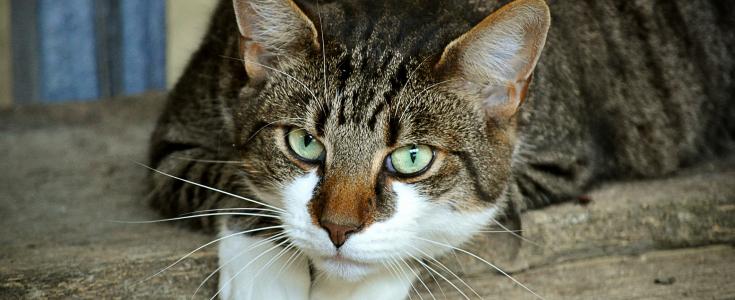Pleural Effusion With Lymphoma in a Feline
Lymphoma in a cat is serious enough, but even more immediately life-threatening are some of the complications that can arise from that cancer. Among the most serious of these is pleural effusion, which happens when the area around the lungs fills up with fluid. Pleural effusion with lymphoma in a feline can be dangerous, but can also be successfully treated.
What is Pleural Effusion?
The lungs of most animals, including humans and cats, are surrounded by a thin sac of tissue called the pleura. In certain circumstances, the space between this sac and the lungs themselves can begin to fill with blood or, more commonly, lymphatic fluid. This creates pressure on the lungs and other organs in the chest cavity and can, if not treated, rapidly cause sickness and death from suffocation.
Symptoms and Causes of Feline Pleural Effusion
Some of the symptoms of pleural effusion include the following:
- Rapid breathing
- Breathing with an open mouth
- Lethargy
- Lack of appetite
- Weight loss
- Chest pains
- Fever
- Coughing
- Unusual positions while sitting or lying down
- Blue tongue or gums
Pleural effusion can occur on its own (called spontaneous pleural effusion) or as a consequence of other health problems, including trauma to the airway, infection, heart or kidney disease, or a variety of cancers. Because lymphoma is by far the most common cancer in cats, it is also the cancer most responsible for pleural effusions.
Mediastinal Lymphoma and Pleural Effusion
Lymphoma is a broad category of cancers that can occur in many places within a cat's body. One such location is the mediastinal area between or in front of the lungs. When lymphoma occurs in this area, it is much more likely to cause a dangerous fluid buildup simply because of its proximity to the lungs and heart. Mediastinal lymphoma is the most common form of lymphoma to be linked to the Feline Leukemia Virus (FeLV), making that virus a major factor for the eventual development of pleural effusion.
Treatment and Prognosis
If your veterinarian determines there is an effusion, either with scans or by listening to the chest region, he may try to drain the fluid. In many cases, this successfully treats the problem. In cats with lymphoma, however, the effusion may reoccur if the underlying cause is not also treated, so a vet will also typically administer treatment alongside chemotherapy for the cancer. In acute cases, cats may need supplemental oxygen until the pressure on their lungs is reduced.
Pleural effusion itself is typically fairly easy to treat and the short-term prognosis is usually good. Treatment for feline lymphoma is also usually successful in the short-term, with remission rates approaching 75 percent. Most cats, however, will not live more than a year following a diagnosis of lymphoma. Life expectancy of lymphoma without treatment is rarely more than six to eight weeks, and pleural effusion with lymphoma in a feline, if left untreated, can kill a cat in a matter of days, or sometimes hours.
Photo: Pixabay




